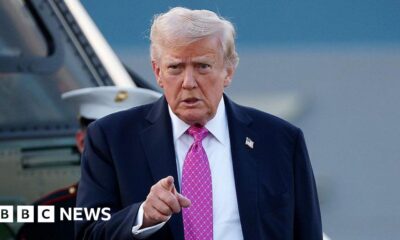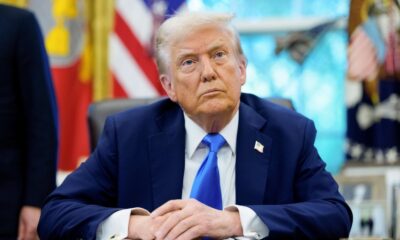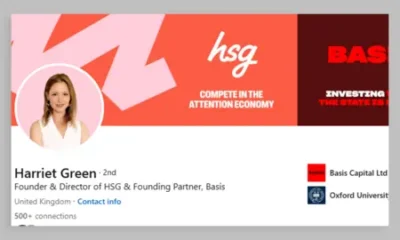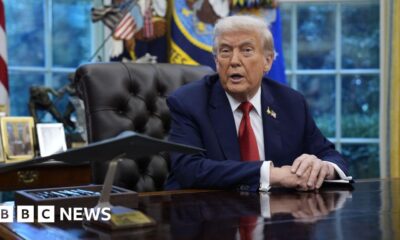Business
Starmer says Labour shied away from illegal immigration concerns
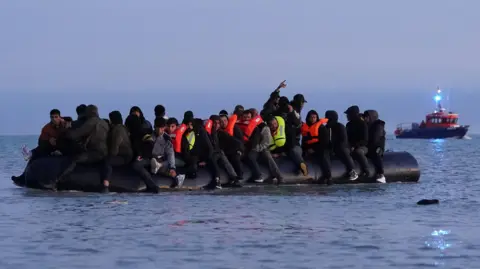
Read full article on post.
Tabby WilsonBBC News
Sir Keir Starmer has publicly acknowledged “where some on the Left went wrong” on immigration, writing in the Telegraph that his party needs to tackle “every aspect of the problem”.
He said that Labour was being forced to counter the “rise of the populist Right”, noting that the increasing popularity of Reform UK posed a challenge for both the Conservatives and the left.
The prime minister is expected to announce plans for a compulsory UK-wide digital ID scheme in a speech later on Friday, as part of the Labour Party’s push to address illegal immigration.
His government has been under increasing pressure to tackle the issue, after small boat migrant crossings surpassed 50,000 in August.
“The first essential part in doing that [challenging the populist Right] is in recognising where some on the Left went wrong on the issue of immigration,” Sir Keir wrote in the Telegraph piece.
“There is no doubt that for years, Left-wing parties, including my own, did shy away from people’s concerns around illegal immigration. It has been too easy for people to enter the country, work in the shadow economy and remain illegally.”
Ahead of his speech, Sir Keir wrote that Labour “must make and win the case for patriotic national renewal, based on enduring British values”, calling on “fair-minded Britons” to reject Reform’s “toxic” solution.
His piece also detailed the perils of “poisonous” online debate, and warned of a “coming struggle, a defining struggle, a violent struggle” for the nation.
Addressing the wave of protests that took place outside UK asylum hotels over the summer, the prime minister said his party would “reject the quick-fix solutions from those who want to divide” and instead focus on “restoring power to local communities”.
The government announced a £5bn funding boost for 339 “overlooked” communities on Thursday, with specific spending to be determined by those who “know their communities best”.
The announcement is part of Labour’s strategy to tackle the electoral threat posed to them by the rising popularity of Reform UK, and will include the £1.5bn pledged to 75 of the “most deprived” areas in the UK earlier this year.
Sir Keir is expected to defend his party’s approach to immigration in his speech, detailing the new digital ID scheme while laying blame for illegal immigration on 14 years of “Conservative government’s failure”.
He will be addressing the Global Progress Action Summit in London. Labour’s annual party conference opens in Liverpool this weekend.
Conservative leader Kemi Badenoch has characterised the announcement as a “desperate gimmick” to distract attention from the “leadership manoeuverings” of Greater Manchester Mayor Andy Burnham ahead of Labour’s annual conference next week.
Reform denounced the plan as a “cynical ploy to fool voters that something is being done about illegal immigration”.
The Liberal Democrats, who played a central role in blocking the previous Labour government’s ID cards, have said they “cannot support” a mandatory scheme.
This summer the UK and France agreed to a year-long “one in, one out” pilot scheme as part of the government’s strategy to deter small boat crossings.
Under the deal, the UK can immediately detain anyone who crosses the English Channel and agree with the French authorities to return the individual in a two-week time frame.
For each migrant the UK returns to France, another migrant with a strong case for asylum in the UK will come in return.
Business
Trump announces new tariffs on drugs, trucks and kitchen cabinets
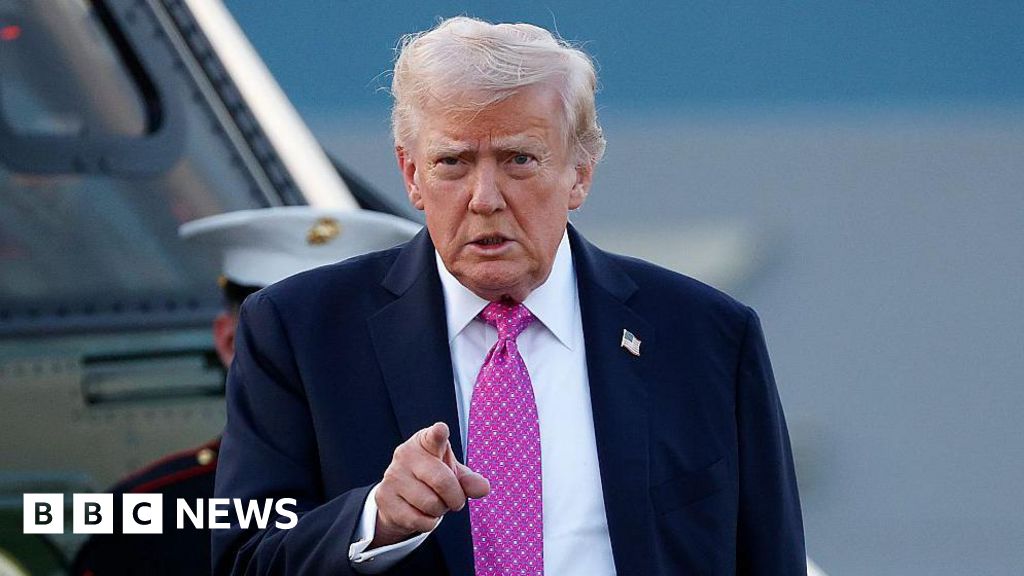
Read full article on post.
President Donald Trump announced a new wave of tariffs on Thursday, including a 100% levy on branded drug imports, unless a firm is building a manufacturing plant in the US.
Washington will also impose a 25% tariff on imports of all heavy-duty trucks and 50% levies on kitchen and bathroom cabinets, he said as he announced a slew of industry-focused duties on his Truth Social platform.
“The reason for this is the large scale “FLOODING” of these products into the United States by other outside Countries,” Trump wrote, citing the need to protect American manufacturers from foreign imports.
The announcements come despite calls from US businesses for the White House to not impose further tariffs.
Trump said the tariffs on heavy trucks were to protect US manufacturers from “unfair outside competition” and that the duties would help lift American companies such as Peterbilt and Mack Trucks.
These firms “will be protected from the onslaught of outside interruptions”, he wrote.
The new levies on kitchen and bathroom cabinets, as well as some other furniture, were in response to high levels of imports, which hurt local manufacturers, the president said.
He added that the US would start charging a 30% tariff on upholstered furniture from next week.
The new duties come as part of an expansion of Trump’s tariff policies, which have targeted both global trading partners and specific industries.
Trump’s sweeping new tariffs on more than 90 countries came into effect in early August, as part of his policies aimed at boosting jobs and manufacturing in the US, among other political goals.
Earlier this year, the US Chamber of Commerce urged the White House against introducing new tariffs, arguing that many parts used in truck production are sourced “overwhelmingly” from countries like Mexico, Canada, Germany, Finland and Japan.
The organisation added that these countries are “allies or close partners of the United States posing no threat to US national security.”
Mexico and Canada are among the biggest suppliers of parts for medium and heavy-duty trucks, accounting for more than half of total US imports in the sector last year, said the chamber.
It warned that it is “impractical” to expect many of these parts to be sourced domestically, resulting in higher costs for the industry.
The new tariffs favour domestic producers but are “terrible” for consumers as prices are likely to rise, said trade expert Deborah Elms from research firm Hinrich Foundation.
The levies would cover more products at higher rates than Trump’s reciprocal tariffs, which were aimed at correcting trade imbalances with other countries.
These industry-specific import taxes could serve as a back-up plan to secure revenues as Trump’s sweeping duties on global trading partners are being challenged in court, said Ms Elms.
Business
Reform faces questions over tech investor’s role in cost-cutting drive
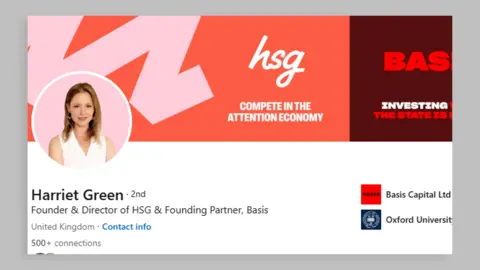
Read full article on post.
Joshua NevettPolitical reporter
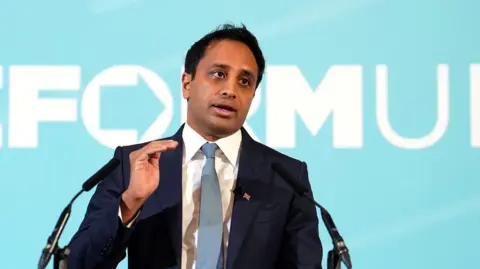 PA Media
PA MediaA tech start-up investor is taking a leading role in Reform UK’s efforts to access sensitive data in a bid to identify savings in one council controlled by the party, the BBC has learned.
Harriet Green, the founder of Basis Capital, is helping Reform UK’s Department of Government Efficiency (Doge) find ways to cut costs at West Northamptonshire Council.
She is an entrepreneur whose firm invests in businesses that provide services and work with, or compete against, local government.
Local councillors have raised concerns about whether it is appropriate for Green to access council data and questioned whether businesses backed by Basis would gain an unfair advantage over competitors.
Green declined to comment. Reform UK did not respond to requests for comment.
The BBC has been told Green is the only person Doge has put forward to access data at the council in Northamptonshire so far.
Senior council officers are vetting Green as they consider a proposal to allow her to analyse records of spending on items such as IT systems and hotels housing asylum seekers.
When Doge was launched after May’s local elections, Reform UK said a team of software engineers, data analysts and forensic auditors would “visit and analyse” spending at all of the councils controlled by the party to find “waste and inefficiencies”.
But the unit has been hampered by legal constraints and has not been able to access any council data so far.
Doge has only visited three of the councils controlled by Reform so far. It’s planning to visit a fourth, Lancashire County Council, in October.
Reform UK sources say they see the proposed data-sharing exercise and Green’s role in it in Northamptonshire as a potential model for gaining access to sensitive information at other councils.
Green’s company, Basis, launched last year and describes itself as an “early stage investor reimagining what governments can no longer deliver”.
Basis invests in companies such as Civic Marketplace, which is a public procurement platform designed to connect government agencies with service contractors.
In an interview with the Spectator this year, Green said Basis was a private fund set up to “invest in companies that are building where the state is failing”.
“A loftier way of putting that is we’re trying to outcompete the state,” said Green, a former intern at the Adam Smith Institute, a pro-free market think tank.
Councillor Daniel Lister, who leads Conservative opposition at the council, said Green’s role raised questions about potential conflict of interest given Basis’s stated mission and investments.
Lister said: “When a party unit opens the door to council data, it creates an inside track where firms built to outcompete the state will thrive.”
Jonathan Harris, the Liberal Democrat group leader, questioned what experience Green had in data handling and identifying savings at local authorities.
“There are questions not only about skill-sets but also about whether being involved in a Doge-type activity could provide some form of competitive advantage and access to information which others would not have,” Harris said.
“This would not be allowed under procurement rules for public bodies.”
The councillor said Doge and Green must be vetted by the council’s scrutiny committee if approval was granted.
Legal barriers
Doge is led by Zia Yusuf, Reform UK’s head of policy and its former chairman, and was inspired by billionaire Elon Musk’s efforts to cut government costs in the US.
It was set up in June this year after Reform UK took control of 10 local authorities in May’s local elections.
“Our team will use cutting-edge technology and deliver real value for voters,” Yusuf said.
But progress has stalled over data access and instead, Reform UK councillors are trying to find savings without Doge.
In Kent, a cabinet member for local government efficiency has been created, and the county council’s Reform leader has claimed potential savings worth millions have been identified.
Lancashire is finding it tougher, with the Reform UK county council leader there telling the BBC cutting costs won’t be easy.
Councils across England face significant financial pressures after years of tight funding.
Yusuf’s Doge has come closest to accessing data in West Northamptonshire, where in July the cabinet “approved a mechanism to review information sharing arrangements that could lead to potential future opportunities for identifying savings and efficiencies at the authority”.
In a report, the council said its executive leadership team had met “Reform UK visitors” twice to discuss “potential opportunities to share data with third parties for the purpose of identifying efficiencies and potential savings”.
The report said by law, local authorities must not “promote or publish any material to affect public support for a political party”.
“As the Doge offer is from and associated with Reform UK, a political party, this prohibition and the public law principles alongside it are of particular impact,” the report said.
The council said it understood members of Yusuf’s Doge team were “not employed by Reform UK” and had offered their services at no charge.
Council sources say they are still working through the vetting process.
In the meantime, the party insists the unit’s work is ongoing, pointing to deputy leader Richard Tice’s recent announcement about local government pension schemes.
Yusuf has frequently complained about “waste” in local government and the way in which contracts for services are procured, alleging a lack of competition and corruption.
In her interview with the Spectator, Green was asked whether the political appetite for US President Donald Trump and Doge filled her with confidence.
Green said: “I think there’s a UK-way of doing things that we haven’t felt out yet.
“I don’t think it needs to be brash or kooky or partisan. Those things give you a litmus for something maybe being timely and it’s a good opportunity.”
She added: “I’m not convinced that anyone in the public sector is incentivised in a way that gets good outcomes for the work that they’re doing.”
Business
Trump says he ‘will not allow’ Netanyahu to annex West Bank
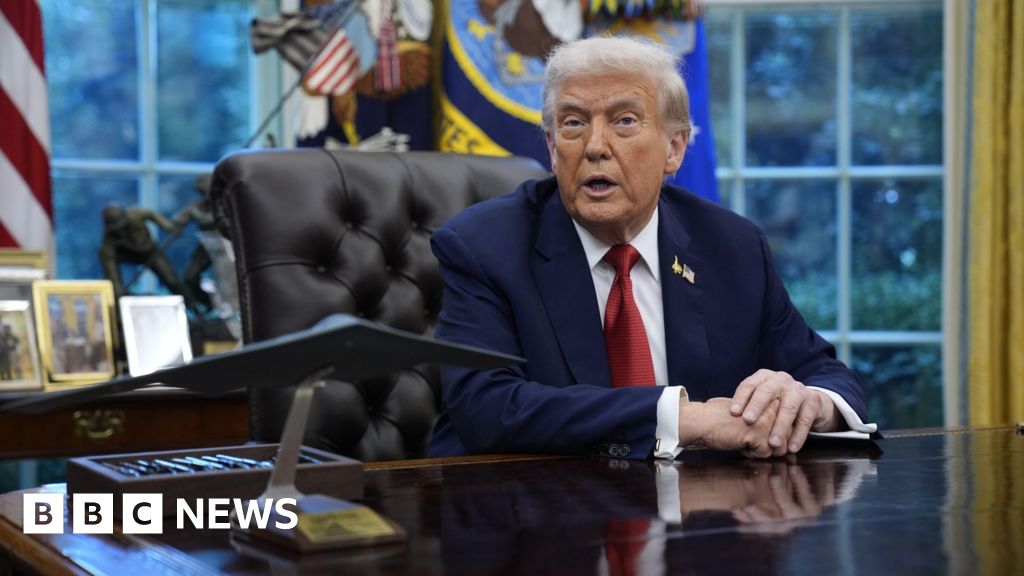
Read full article on post.
US President Donald Trump has said he will not allow Benjamin Netanyahu to annex the Israeli-occupied West Bank.
Speaking ahead of the Israeli prime minister’s address to the UN General Assembly on Friday, the US president told reporters in the Oval Office: “I will not allow Israel to annex the West Bank … It’s not going to happen.”
Trump, who will meet Netanyahu on Monday, also said a Gaza deal was “pretty close”.
Israel is facing increasing global pressure to end the war in Gaza and occupation of the West Bank as a wave of Western states formally recognise an independent Palestinian state. Far-right Israelis see annexation as a way to stop this prospect.
Ultranationalists in Netanyahu’s governing coalition have repeated calls for Israel to annex the West Bank, part of the Palestinian territories, outright.
The UK and Germany say they have warned Israel against annexation, while UN Secretary General António Guterres said at the UN on Monday it would be “morally, legally and politically intolerable”.
On Thursday, Trump told reporters in the Oval Office that he had spoken to Netanyahu as well as other Middle Eastern leaders.
“We’re getting pretty close to having a deal on Gaza, and maybe even peace,” Trump said.
Addressing the UN General Assembly via video link on Thursday, Palestinian President Mahmoud Abbas said he was ready to work with world leaders to implement a peace plan for Israel and the Palestinians announced by France on Monday.
Abbas, 89, was barred by the US from travelling to New York to appear in person.
He thanked those countries which had recently recognised a Palestinian state in a wave of declarations that started with Canada, Australia, the UK and Portugal on Sunday, followed by France, Belgium, Luxembourg, Malta, Monaco, San Marino, Andorra, and Denmark.
The US is currently opposed to recognising Palestine, saying such a move is a reward for Hamas.
“Hamas will not have a role to play in governance,” Abbas said in his speech. He also called for a Palestinian state to assume “full responsibilities” for the Gaza Strip following an Israeli withdrawal and connect it with the Israeli-occupied West Bank.
Trump met on Tuesday at the United Nations with the leaders of key Arab and Muslim nations who warned him of consequences if Israel moved ahead with annexation.
“I think the president of the US understands very well the risks and dangers of annexation in the West Bank,” Saudi Arabia’s Foreign Minister Prince Faisal bin Farhan told reporters.
On Wednesday morning Israel closed the only crossing between the Israeli-occupied West Bank and neighbouring Jordan, stopping more than two million Palestinians from accessing the outside world.
The closure came days after two Israeli military personnel were shot dead near the crossing by a Jordanian gunman, who was killed at the scene.
In Gaza, more than 80 Palestinians, including women and children, were killed by Israeli fire on Wednesday, most of them in Gaza City, local hospitals said.
The Israeli military launched a campaign in Gaza in response to the Hamas-led attack on southern Israel on 7 October 2023, in which about 1,200 people were killed and 251 others were taken hostage.
At least 65,419 people have been killed in Israeli attacks in Gaza since then, according to the territory’s Hama-run health ministry, including more than 18,000 children.
In August, the Integrated Food Security Phase Classification (IPC), a UN-backed body, said more than half a million people across Gaza were facing “catastrophic” conditions characterised by “starvation, destitution and death”. Netanyahu has repeatedly denied starvation is taking place in Gaza.
A United Nations commission of inquiry found Israel has committed genocide against Palestinians in Gaza, in a report Israel’s foreign ministry categorically rejected as “distorted and false”.
Israel is under increasing pressure to end the war and occupation.
In addition to more countries recognising a Palestinian state, the European Commission has unveiled plans to restrict trade with Israel and impose sanctions on extremist ministers in its government, which – if adopted – would be the EU’s toughest response to the war in Gaza.
This week Microsoft cut off some services to a unit of Israel’s Ministry of Defence after an investigation found its technology had been used to conduct mass surveillance on people in Gaza.
But Netanyahu has called for Israel to embrace increased self-sufficiency.
-
Culture3 days ago
Taylor Swift’s new cinema outing generates more than €12million in just 24 hours
-
Politics3 days ago
European Parliament snubs Orbán with vote to shield Italian MEP from Hungarian arrest
-
Health3 days ago
EU renews support for WHO’s Universal Health Coverage Partnership
-
Culture2 weeks ago
Life, loss, fame & family – the IFI Documentary Festival in focus
-
Culture3 days ago
Twilight at 20: the many afterlives of Stephenie Meyer’s vampires
-
Environment6 days ago
Key oceans treaty crosses threshold to come into force
-
Culture2 months ago
Fatal, flashy and indecent – the movies of Adrian Lyne revisited
-
Culture1 week ago
Farewell, Sundance – how Robert Redford changed cinema forever



